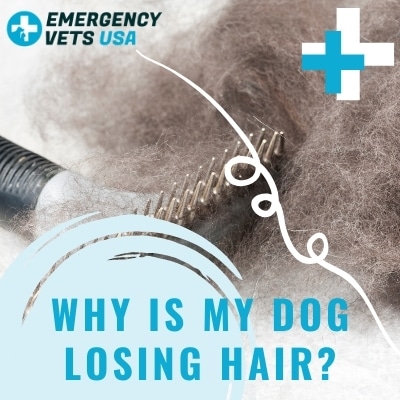Why Is My Dog Losing Hair - This is a common question among pet owners. If you've noticed your furry friend is shedding more than usual, there may be a few reasons why. Keep reading to learn more about the common causes of hair loss in dogs.
Stress and Anxiety
Symptoms
Dogs can experience stress and anxiety just like humans can. And just like humans, their hair can start falling out because of it. If you've noticed your pup has been acting more anxious lately, keep an eye out for these symptoms:
- Pacing
- Panting
- Whimpering
- Loss of appetite
Stress-related hair loss is most common in dogs who have undergone sudden changes in their environment or routine; such as moving to a new home, a change in the family dynamic, or loud noises like fireworks.

Dietary Issues
Symptoms
Your dog's hair can also start falling out because of dietary issues. If you've noticed your furry friend's coat is looking less shiny than usual, or if they're losing hair in patches, it may be time to look at their diet. Symptoms of dietary-related hair loss include:
- Dullness in the hair
- Hair loss in patches
- Itchy skin
- Dry skin
If you suspect your dog's hair loss is diet-related, talk to your vet about switching to a different type of food or incorporating supplements into their diet.

Parasites
Symptoms
Parasites like fleas, ticks, and mites can also cause hair loss in dogs. If your furry friend has come into contact with any parasite, be on the lookout for these symptoms:
- Biting or licking of the affected area
- Redness and inflammation
- Itching
- Scabbing
If you suspect your dog has parasites, take them to the vet. Depending on the severity of the infestation, they may prescribe medication to get rid of them.

Medical Conditions
Symptoms
It's important to keep in mind that hair loss in dogs can also be a symptom of an underlying medical condition. If you've ruled out stress, diet, and parasites, consider taking your dog to the vet to check for these common medical conditions:
- Thyroid disorder
- Cushing's disease
- Allergies
- Cancer
If your vet suspects your dog has an underlying medical condition, they may run tests or prescribe medication to help manage it.

Genetics
Symptoms
Finally, it's important to remember that some breeds of dogs are simply more prone to hair loss than others. If you have a breed that's known for hair loss, be on the lookout for these symptoms:
- Circular hair loss (alopecia areata)
- Thinning of the coat
- Bald spots
- Scratching or licking of the affected area
If you suspect your dog's hair loss is genetic, talk to your vet about ways to manage the symptoms.

How to Treat Hair Loss in Dogs
The treatment for your dog's hair loss will depend on the underlying cause. If it's stress or anxiety-related, try to identify the source of the stress and remove it if possible. If it's diet-related, talk to your vet about changing your dog's food or adding supplements to their diet.
If your dog has parasites, your vet will likely prescribe medication to get rid of them. If it's a medical condition, they may prescribe medication or suggest management strategies like cleaning the affected area or limiting exposure to allergens.
It's always a good idea to bring up any concerns with your vet. They can help you narrow down the underlying cause of your dog's hair loss and suggest appropriate treatment options.
Prevention Tips
While certain breeds of dogs may be more prone to hair loss, there are some preventative measures you can take to minimize the risk of hair loss:
- Regular grooming: Brushing and bathing your dog regularly can remove excess hair and prevent tangles and mats from forming.
- Proper nutrition: Consult with your vet to make sure your furry friend is getting the right amount of nutrients in their diet.
- Parasite prevention: Use flea and tick preventatives and check your dog regularly for any signs of infestation.
- Stress reduction: Try to identify any environmental factors that may be causing stress for your dog and remove them if possible.
If you notice any changes in your dog's behavior or physical appearance, don't hesitate to bring them to the vet. Catching issues early on can help prevent more serious health problems down the road.
Remember, your furry friend relies on you to take care of them. By staying vigilant and taking preventative measures, you can help ensure that they stay happy and healthy for years to come.
Find more articles about Why Is My Dog Loosing Hair